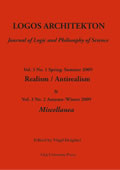Collectives as Theoretical Entities
Collectives as Theoretical Entities
Author(s): David BottingSubject(s): Philosophy
Published by: Presa Universitara Clujeana
Keywords: methodological individualism; collective autonomy; entity realism; reductionism; positivism; intentional stance.
Summary/Abstract: The question is often asked whether a group of agents cooperating together constitutes an agent in its own right. I want to approach the problem by starting from a slightly different question: does a group constitute an entity in its own right? From positivism I offer the answer that groups and individual agents are on the same footing with regards to being counted as entities, and from entity realism I add that terms referring to these entities do genuinely refer provided that we can manipulate these entities. There is still a significant difference, though, between individual agents and groups that should not lead us to abandon methodological individualism. A group cannot be an agent in its own right because it does not possess intentional properties in its own right. Individuals are irreducible in a sense that groups cannot be, because no proper part of an individual has intentional properties. Groups are reducible, because they have no properties that cannot be reduced to the properties of its individual members; the group mereologically supervenes, in possibly complex ways, on its members.
Journal: Logos Architekton. Journal of Logic and Philosophy of Science
- Issue Year: 3/2009
- Issue No: 01
- Page Range: 161-185
- Page Count: 25
- Language: English

